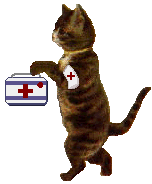 necessary.
Ideally, you will also have the name of a vet that you can go to if you
do have an emergency. The last thing you want to be doing is hunting
through the phone book trying to find a vet you can go to and trying to
locate directions!
necessary.
Ideally, you will also have the name of a vet that you can go to if you
do have an emergency. The last thing you want to be doing is hunting
through the phone book trying to find a vet you can go to and trying to
locate directions!
Anything can happen while you are away -- and you need to be able to
deal with it because your cat depends on you. During thirty years of traveling
with my cats, I have rarely had a medical emergency. But they can
and do happen. Make sure you have your cat's health records
with you so that you can give them to any vet you need to go to while you
are away. You should also have your vet's phone number with you so
that s/he can be contacted to discuss your cat's situation if  necessary.
Ideally, you will also have the name of a vet that you can go to if you
do have an emergency. The last thing you want to be doing is hunting
through the phone book trying to find a vet you can go to and trying to
locate directions!
necessary.
Ideally, you will also have the name of a vet that you can go to if you
do have an emergency. The last thing you want to be doing is hunting
through the phone book trying to find a vet you can go to and trying to
locate directions!
Diarrhea: Use the medication
prescribed by your vet. If it continues, go to the emergency vet
you have located.
Vomiting: Use the medication
prescribed by your vet. If it continues, go to the emergency vet
you have located.
Poisoning: Despite all your
best efforts, your cat finds a way to get hold of some poison. Immediately
stop your cat from licking its coat and paws and possibly ingesting more
poison. Create an Elizabethan collar -- use piece of cardboard or
a Chinette plate, cut a hole just large enough to go over your cats head.
Now, take a damp wash cloth and wash the paws thoroughly. Then wipe
the coat with the damp cloth to remove as much of the poison as you can.
Call the emergency vet tell them what you have done, what the poison is
(if you know), and see what they want you to do next. Make sure you
take the poison with you so the vet can identify it and get the correct
antidote in place.
Small Cuts:
Wash the area
gently and cut the fur away from the area. Put on Polysporin antibiotic
cream. Repeat twice a day until the cut has healed.
Large Cuts: Take your cat
to the emergency vet you have located as a stitch may be required.